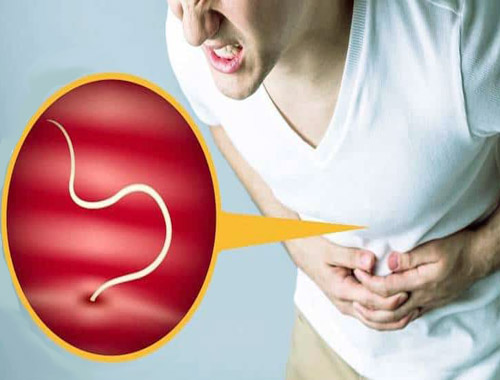Worms, Helminthiasis

Published: 18 Jun 2025
ICD9: 127.9 ICD10: B83.9 ICD11: 1F90
"Worms, Helminthiasis" refers to infections caused by parasitic worms, also known as helminths.
Helminthiasis is the medical term for these worm infections. These worms live and feed inside a host, in this case, a human or animal.
Here's a breakdown:
![]() Worms: This is the general term used to describe the parasitic worms.
Worms: This is the general term used to describe the parasitic worms.
![]() Helminths: This is the scientific term for parasitic worms.
Helminths: This is the scientific term for parasitic worms.
![]() Helminthiasis: This is the disease or infection caused by helminths.
Helminthiasis: This is the disease or infection caused by helminths.
Types of Helminths:
There are several types of helminths that can infect humans, broadly classified into three main groups:
![]() Nematodes (Roundworms): These are cylindrical worms with pointed ends. Common examples include:
Nematodes (Roundworms): These are cylindrical worms with pointed ends. Common examples include:![]()

![]() Ascaris (Ascariasis)
Ascaris (Ascariasis)![]()

![]() Hookworms (Hookworm infection)
Hookworms (Hookworm infection)![]()

![]() Whipworm (Trichuriasis)
Whipworm (Trichuriasis)![]()

![]() Pinworm (Enterobiasis)
Pinworm (Enterobiasis)![]()

![]() Threadworm (Strongyloidiasis)
Threadworm (Strongyloidiasis)
![]() Cestodes (Tapeworms): These are flat, segmented worms that live in the intestines. Examples include:
Cestodes (Tapeworms): These are flat, segmented worms that live in the intestines. Examples include:![]()

![]() Beef tapeworm (Taenia saginata)
Beef tapeworm (Taenia saginata)![]()

![]() Pork tapeworm (Taenia solium)
Pork tapeworm (Taenia solium)![]()

![]() Fish tapeworm (Diphyllobothrium latum)
Fish tapeworm (Diphyllobothrium latum)
![]() Trematodes (Flukes): These are flat, leaf-shaped worms. Examples include:
Trematodes (Flukes): These are flat, leaf-shaped worms. Examples include:![]()

![]() Schistosomes (Schistosomiasis, also known as Bilharzia)
Schistosomes (Schistosomiasis, also known as Bilharzia)![]()

![]() Liver flukes (Clonorchis sinensis, Fasciola hepatica)
Liver flukes (Clonorchis sinensis, Fasciola hepatica)![]()

![]() Lung flukes (Paragonimus westermani)
Lung flukes (Paragonimus westermani)
How Helminthiasis Occurs:
Infections occur through various routes, depending on the specific type of worm:
![]() Ingestion: Eating contaminated food or water containing worm eggs or larvae (e.g., Ascaris, tapeworms).
Ingestion: Eating contaminated food or water containing worm eggs or larvae (e.g., Ascaris, tapeworms).
![]() Skin penetration: Larvae burrow through the skin, often through bare feet in contaminated soil (e.g., hookworms, Schistosomes).
Skin penetration: Larvae burrow through the skin, often through bare feet in contaminated soil (e.g., hookworms, Schistosomes).
![]() Insect bites: Some worms are transmitted through the bites of insects (rare).
Insect bites: Some worms are transmitted through the bites of insects (rare).
![]() Autoinfection: In some cases, individuals can reinfect themselves (e.g., pinworms).
Autoinfection: In some cases, individuals can reinfect themselves (e.g., pinworms).
Symptoms:
Symptoms of helminthiasis vary widely depending on the type of worm, the number of worms present, and the person's overall health. Some people may have no symptoms. Common symptoms can include:
![]() Abdominal pain
Abdominal pain
![]() Diarrhea
Diarrhea
![]() Nausea and vomiting
Nausea and vomiting
![]() Weight loss
Weight loss
![]() Fatigue
Fatigue
![]() Anemia
Anemia
![]() Itching around the anus (especially with pinworms)
Itching around the anus (especially with pinworms)
![]() Malnutrition
Malnutrition
![]() Visible worms in stool
Visible worms in stool
Diagnosis:
Diagnosis usually involves:
![]() Stool examination: To identify worm eggs or larvae.
Stool examination: To identify worm eggs or larvae.
![]() Blood tests: To look for antibodies or eosinophilia (an increased number of eosinophils, a type of white blood cell, which often indicates parasitic infection).
Blood tests: To look for antibodies or eosinophilia (an increased number of eosinophils, a type of white blood cell, which often indicates parasitic infection).
![]() Imaging tests: In some cases, X-rays, CT scans, or MRIs may be used to detect worms in the body.
Imaging tests: In some cases, X-rays, CT scans, or MRIs may be used to detect worms in the body.
Treatment:
Helminthiasis is usually treated with antiparasitic medications. The specific medication used depends on the type of worm causing the infection. Common medications include:
![]() Albendazole
Albendazole
![]() Mebendazole
Mebendazole
![]() Praziquantel
Praziquantel
![]() Ivermectin
Ivermectin
Prevention:
Prevention is key to controlling helminthiasis. Important preventive measures include:
![]() Proper hygiene: Washing hands frequently, especially before meals and after using the toilet.
Proper hygiene: Washing hands frequently, especially before meals and after using the toilet.
![]() Safe food handling: Cooking food thoroughly, especially meat and fish.
Safe food handling: Cooking food thoroughly, especially meat and fish.
![]() Safe water: Drinking clean, safe water.
Safe water: Drinking clean, safe water.
![]() Proper sanitation: Using toilets and disposing of waste properly.
Proper sanitation: Using toilets and disposing of waste properly.
![]() Wearing shoes: Especially in areas where soil may be contaminated.
Wearing shoes: Especially in areas where soil may be contaminated.
![]() Regular deworming: In areas where helminthiasis is common, regular deworming programs may be recommended.
Regular deworming: In areas where helminthiasis is common, regular deworming programs may be recommended.
In summary, "Worms, Helminthiasis" is a broad term encompassing infections caused by parasitic worms. These infections can have a range of symptoms and are diagnosed through stool examination and other tests. Treatment is usually with antiparasitic drugs, and prevention relies on good hygiene, sanitation, and safe food and water practices.